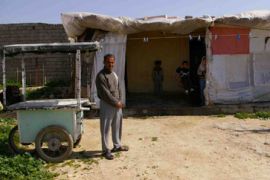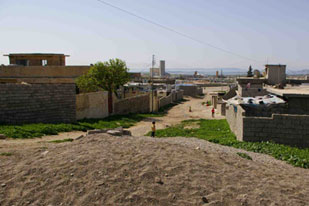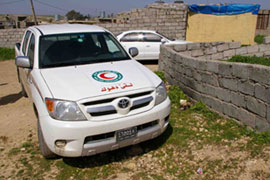Iraq’s displaced run from death
Aid agencies struggling to cope as thousands flee the violence and threats.

 |
| Thousands of Iraqis have left mixed neighbourhoods since the US-led invasion in 2003 |
Said Muhamed Said Doski started packing as soon as he was told that his seven-year-old son would be shot if the family did not leave their home and neighbourhood in the northern city of Mosul.
In a matter of hours, they had packed what they could and left the house they had lived in all their lives.
In doing so, the Doski family joined thousands of other Iraqis who have fled their homes in mixed neighbourhoods throughout Iraq since the US-led invasion in 2003.
Abdulmajid Qasim, director of the Iraqi Red Crescent’s Dohuk branch, said many families try to leave the country altogether, often for Jordan or Syria.
But if they are unable to cross the borders, he said: “Shia families flee to Shia areas in the south, Sunnis to Sunni areas in the centre and Kurds and Christians to the Kurdish-administered areas in the north.”
As the numbers of displaced people seeking refuge increases, aid agencies and regional governments say they are struggling to cope with the influx.
Dr Goran A Sabir, director of the Public Aid Organisation, a legal advice centre for the displaced in Irbil, the capital of Iraq’s northern Kurdistan region, said: “The United Nations High Commissioner for Refugees [UNHCR] estimates around two million Iraqis have left the country altogether since 2003, while two million more have become IDPs – internally displaced people.”
Ethnic cantons
The movement of refugees is symptomatic of how the Iraq conflict has upset the country’s religious and ethnic balance.
| Your Views |
|
“The chances of success [in Iraq] are essentially zero because the Iraqi people have no voice” Non Sequitur, Cadiz, Spain |
People fleeing from the violence and threats often settle in areas which share their background, effectively ending an intermixing that has lasted centuries.
Baghdad’s Dora district was one such mixed neighbourhood and one of Iraq’s oldest Christian enclaves. But since the US-led invasion, Dora has been riven by violent crime, kidnappings and sectarian attacks.
“We had a very old church and many people in our community there,” Sarra Shammu Adem said. “Now though, I doubt if any Christian family is left.”
Adem’s own flight from Baghdad was tragic.
“Because of the violence, we had decided to leave and packed our car up,” she said.
“Our neighbours said, ‘have lunch with us one last time’, and just then, three men came up to my husband and shot him in the street – killed him there just as we were about to go.”
Fleeing to Kurdistan
Adem’s family now lives in a suburb of the city of Dohuk, in the Kurdistan Region, along with many other Christian families who fled.
The suburb houses many Kurdish families, many of whom – like Said Muhamed Said Doski – left neighbouring Mosul, a city divided along ethnic lines by the Tigris river.
The eastern bank is largely Kurdish and the western bank predominantly Arab.
“I’m not afraid any more because now I am in Kurdistan,” Doski said. “We left along with four other families. We had all been threatened – they say leave or we kill your children. We know who they are who are doing this, the Arab groups, but what can we do? I have three children. The youngest is six.”
Arabs, too, are fleeing the violence in the country.
“I am from Baghdad,” Zena Mohammed Hassan, a Sunni Arab doctor, said.
“When I go back now, I don’t recognise anyone in my neighbourhood. Everyone has gone. The only members of my family who remain are my parents and they are now leaving, coming here to Irbil.”
Saba Qaiss Al-Zubairi, an engineer, said: “I have lost an eardrum from a bomb blast, I have shrapnel in my arm and burns across my back.
“Every day there you see people killed, shot, blown up. I have been threatened so often and even had a gun put in my face.”
Draining capacity
But as the Kurdish north increasingly becomes a destination for refuge seekers, the authorities there say they are near the point of saturation.
 |
| The Iraqi Red Crescent is struggling to cope with the number of displaced people |
“We estimate there are now around 10,000 IDP families just in Irbil,” Nawzad Hadi Mawlood, the city’s governor, said.
“That’s about 15,000 to 16,000 people. They all need help, they are running from death, so we must open our doors to them. But we don’t have the capacity to give them the support they sometimes need. They’ve lost everything.”
The Iraqi Red Crescent estimates that about 10 per cent of those who have fled to the Kurdistan Region are in a desperate situation, needing food, shelter and clothing.
“One of the big problems is economic,” Qasim said. “Rents have gone up, and families cannot afford the housing.”
Many families that have rented accommodation have been unable to afford to stay more than a few months.
Zahra Hamza Ahmed, originally from Mosul, said: “We haven’t paid for the last two months and now the landlord wants to evict us.
“We are two families in this house paying $250 a month. One son was wounded and cannot work, the other works in a shop and makes maybe $50 a month. We have to choose between the rent and eating.”
Lacking resources
The local Iraqi Red Crescent does what it can to help, but says it lacks resources.
“We deliver food and non-food aid in batches of 400 families,” Qasim said. “At the rate at which new ones are arriving, we will get round to everyone once every two years.”
A plea is therefore going out to international agencies and governments to assist Iraq’s displaced people.
“We want to construct proper camps for these people,” Qasim said. “We can put those most in need there and distribute the aid directly. At the moment, people are split up all over the place and it is difficult to get assistance to them.”
The Kurdistan Regional Government has agreed to allocate an area of land for such a camp and to provide services such as water and electricity.
Some people hope that an international conference on Iraqi IDPs in Geneva this month will yield commitments to help the Kurdish authorities and Syria and Jordan, which have taken in millions of Iraqis.
“All our lives we have been at war,” Adem said. “For us it is finished here. We have nothing now, here or in Baghdad. We want to leave, to go anywhere just to be at peace.”